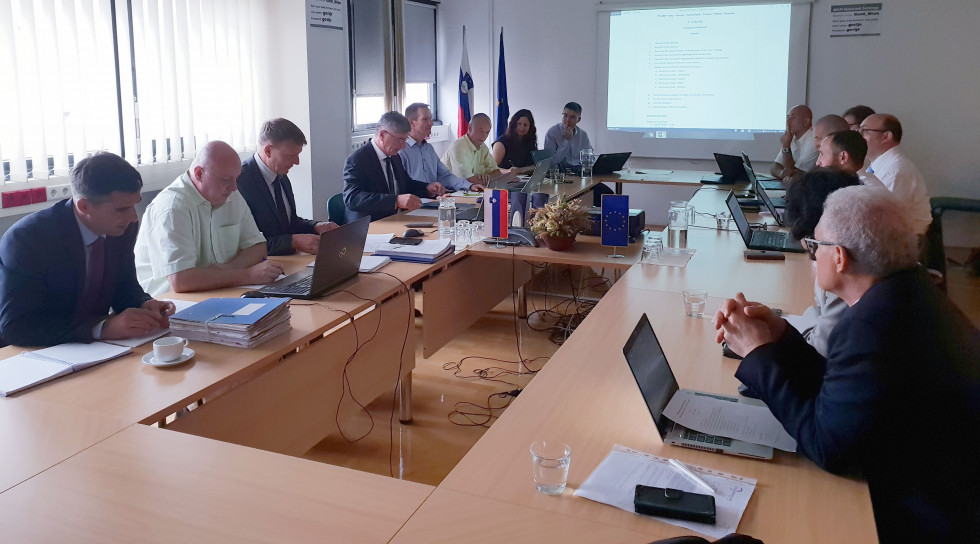Seeking solutions to radio interference at the third ITU multilateral meeting
The third multilateral meeting focused on finding solutions to resolve mutual radio interference caused by the inconsistent use of radio spectrum by Italy. For the purpose of radio broadcasting, Slovenia’s neighbouring country also makes use of radio frequencies allocated to neighbouring countries by the 1984 Geneva Agreement.
The meeting was opened by Mr Rudi Medved, the minister responsible for electronic communications, who stressed the importance of the internationally harmonised use of radio spectrum for Slovenia. "We understand it as vital to ensuring that citizens have equal access to information and to exercising the right of every person to be informed. In this respect, the quality of the reception of broadcasting programmes by using radio spectrum is one of the cornerstones of the democracy in the media sphere." The Minister noted with satisfaction that Italy had taken steps to resolve the disruptions of the television broadcast spectrum and thanked the ITU for intervening. Slovenia believes that through joint efforts of all actors a solution to the FM radio spectrum will be reached. He stressed in particular the importance of harmonising the use of the radio spectrum when introducing the DAB+ digital radio standard, and that there was no reason for interference with FM radio to reappear. The Minister concluded his opening speech with the expectation to seek tangible solutions that would be in the interest of all actors. When we solve this long-standing problem, it will be easier for us to focus on common development challenges in this part of Europe, he said. He gave his assurance that Slovenia would continue to be a constructive partner.
The two-day meeting mainly focused on resolving individual cases of radio interference included in the priority list that was created at the first meeting in 2017. The list is kept up to date and adjusted according to the implemented measures. The Italian representatives proposed country-specific technical solutions to the key cases of interference, which should be implemented by the two parties concerned in order to remedy the interference. The representatives of neighbouring countries took note of the proposals but they largely questioned their feasibility and effectiveness and proposed their own solutions. The national authorities responsible for the management of the radio spectrum will analyse the proposed solutions and submit official responses.
Attention was also paid to the harmonisation of the use of radio spectrum for the needs of DAB+ digital radio. Italy's representatives reported on progress in drawing up the spectrum usage plan for DAB+. In 2017, Italy passed a law that only allows the use of internationally harmonised frequencies while the existing interferences go back to the period prior to the adoption of this law. In accordance with their plan to use spectrum in the 700 MHz band, all interference to digital radio broadcasting will be phased out by 2022, which was largely welcomed by the representatives of other countries. Croatia expressed its dissatisfaction with the fact that, because of the increased interference in the meantime, the area along the Adriatic Sea will not be able to introduce DAB+ radio.
Slovenia's representatives informed the other participants of the legal cases between Slovenian and Italian radio stations, suggesting a more resolute use of legal remedies to protect our interests. One case is still pending in Switzerland while other countries have no such cases. We agreed that Slovenia would provide Italy with a list of radio stations facing lawsuits, since these are cases from the priority list of interferences; consequently, proposals for technical solutions will be drafted. The Italian administration has so far not been aware of cases of law.
In conclusion, the participating countries agreed to hold bilateral meetings until the next multilateral meeting in May or June 2020, at which they will seek solutions to priority interferences. Italy will keep its neighbouring countries abreast of the amendments to their legislation to create a regulatory environment for the FM spectrum management that complies with the ITU rules and agreements. A meeting of the countries of the Adriatic region will be held in Rome in July this year. Italy, Croatia, Montenegro and Slovenia will follow-up on talks on the DAB+ distribution of individual channels.


